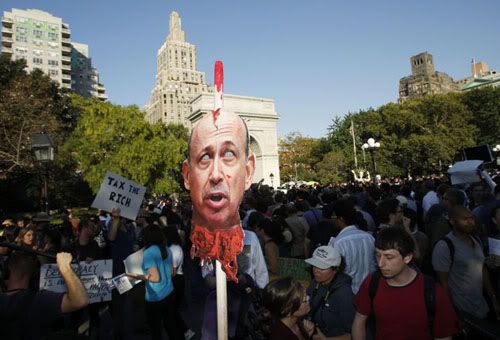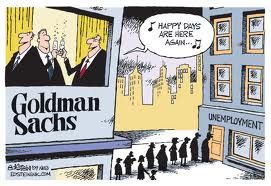Cross posted from The Stars Hollow Gazette
Yves Smith at naked capitalism and Marcy Wheeler at emptywheel have been following the latest banking scandal with a certain amount of “glee” as New York Superintendent of Financial Services, Benjamin Lawsky, Federal regulators (mainly Treasury and the Federal Reserve) and Mr. Lawsky’s target, the British bank, Standard Charter, all do the “Rule of Law” waltz in the media.
The “dance” so far has resulted in a flurry of furious responses to Mr. Lawsky’s charges that the Standard Charter Bank (SCB) laundered billions of dollars for Iran hiding the transaction from federal investigators for 10 years.
These are the latest developments over the last few days since the story broke:
First from Yves where she confesses her enjoyment of the “dust up” and the latest counter by SCB to sue Mr. Lawsky:
The lead story in the Financial Times on SCB is so obviously barmy that I’m astonished that the pink paper would give it prominent play. The headline: StanChart seeks advice over countersuit. Even floating this as an course of action reeks either of desperation to create positive news hooks or delusion:
The bank’s legal advisers believe “there is a case” for claiming reputational damage, according to two people close to the situation, although StanChart is conscious of the delicacy of taking an aggressive stance towards its regulators.
The whole “delicacy” part is code for this having odds of close to zero of happening, so this looks like yet more spin.
The damage was done by the threat to yank the license and access to dollar clearing services, not the “rogue institution” label in the order. And as we’ve written in earlier posts, despite the spinmeister’s efforts to contend otherwise, Lawsky has cited violations of New York law that appear to let him get there, in addition to the charge under the Federal laws on transfers to Iran.
Yves notes that the likelihood of this lawsuit going forward is “zero” since the risk of losing in a NY civil court and the exposure of any other damning evidence that the superintendent has would be a disaster for SCB.
She also highlighted a comment made by Frank Partnoy, former derivatives salesman, now law professor, who noted:
Indeed, the order puts the bank’s senior attorneys and compliance officers at the heart of the wire stripping scheme, even when outside counsel advised otherwise. As early as 1995, soon after President Bill Clinton announced economic sanctions against Iran, the bank’s general counsel allegedly “embraced a framework for regulatory evasion”. He allegedly strategised about how to avoid scrutiny by the US Office of Foreign Assets Control, known as OFAC, and instructed employees that a memorandum describing the plan to avoid regulatory compliance was “highly confidential & MUST NOT be sent to the US”….
As recent debacles at Barclays, HSBC and now Standard Chartered demonstrate, employees of big global banks increasingly lack a moral compass. Some general counsels and compliance officers do provide ethical guidance. But many are facilitators or loophole instructors, there to show employees the best way to avoid the law. Not even mafia lawyers go that far; unlike many bankers, mobsters understand the value of an impartial consigliere who will tell them when to stop.
If silly civil lawsuits weren’t enough, the original Reuters’ article, the source of Marcy Wheeler’s original post, was edited to exclude the orders of magnitude of the fraud:
The Reuters article was a pretty damning picture of how the Get Out of Jail Free industry works.
And then, the most damning parts of the article disappeared (Update from Briinhild: the full story is back up). As Yves discovered later in the day yesterday, Reuters pulled those paragraphs of the story that described this whole process.
Yves then posted that Reuters was running interference for elite corruption by scrubbing the article clean of the damning parts and posted original Reuters’ article:
Now I decided to go have a look myself. Being on the vampire shift, I didn’t go looking until mid afternoon. And guess what, the story that was now at that URL was not the same story. Yes, there was a story on Standard Chartered. But the version that Marcy worked from was apparently the original, released at 00:28 AM, titled “U.S. regulators irate at NY action against StanChart.” I’ve loaded that version in a Word and put it up at ScribD, and am embedding it below. It’s 1766 words. Be sure to download it if you are interested in this topic.
Apparently, as was pointed out by an emptywheel reader, Briinhild, Marcy and Yves must have embarrassed Reuters because they reposted the original article later that day.
The latest today from Yves, this “plot thickens” as Federal regulators try to “leash and collar” Superintendent Lawsky:
Today, the Wall Street Journal reported that, “Regulators Seek Unity in U.K. Bank Talks.”
If you read the article, a more accurate headline would be “Federal regulators desperate to get in front of Lawsky mob and call it a parade.” All the article says is the mucho unhappy and very much outflanked Federal regulators have gotten a meeting with Lawsky. Just look at the disconnect between the PR in the first paragraph and the actual state of play in the second:
U.S. authorities are forming a group with New York’s top financial regulator to negotiate a settlement with Standard Chartered over allegations it illegally hid financial dealings with Iran.The U.S. Treasury Department, Federal Reserve, U.S. Department of Justice and Manhattan district attorney’s office are scrambling to reach an understanding with the New York State Department of Financial Services over the ground rules for negotiations with the U.K.’s fifth-largest bank by assets, according to people familiar with the talks.
This is hysterical. “Ground rules for negotiations”? Lawsky does not need the permission of Geithner et. al. to negotiate with Standard Chartered. As long as Lawsky has Cuomo’s backing, he has all the leverage here. And three independent sources told me as of today that Cuomo was fully behind Lawsky. That means he is likely to remain free to operate as he sees fit. It’s a given that if the White House had any real sway over Cuomo and saw fit to intervene, they would have done so by now. There is no downside to Lawsky in going through the motions of seeing if there is a way for him to proceed and have the Feds save a bit of face.
Let me stress again: Lawsky has all the cards, and he must know that.
Yves also cites this article from Bloomberg:
New York’s financial-services regulator has grounds to shut Standard Chartered Plc (STAN) in the state even if he accepts the firm’s argument that it illegally laundered only a fraction of the $250 billion he claims.
As the state’s top banking regulator, Benjamin Lawsky has power to act in his discretion against any financial institution he deems untrustworthy, according to the charter of his year-old department.
Penalties he could impose include fines and the revocation of the bank’s license to operate in the state…
Even if Standard Chartered’s position is legally sound, the order’s disclosure of internal e-mails suggesting a conspiracy to hide the identity of Iranian clients from regulators has given Lawsky grounds to act when the two sides face off at an administrative hearing Aug. 15, according to experts on both sides of the Atlantic.
“I don’t care whether it is a half of one percent that weren’t right,” said Arthur Levitt, former chairman of the Securities and Exchange Commission,…
“There are going to be more that weren’t right…The e-mails are really outrageous. I think Lawsky has uncovered something that probably has a much deeper depth.”…
Neil Barofsky, who oversaw the U.S. Troubled Asset Relief Program and criticized the U.S. Treasury Department in his book, Bailout, objected to the criticism heaped on Lawsky.
“This is not Lawsky getting ahead of other regulators,” said Barofsky. “This is Lawsky doing his job.”…
“Willful non-compliance is very serious,” said Tariq Mirza, a former Federal Deposit Insurance Corp. official now with Grant Thornton. “If those allegations can be substantiated, regulators throw the book at institutions.”
Another article from the International Business Times that speculates what SBC’s sentence would be if it were an individual found guilty of these crimes:
Under New York state statutes against those two crimes, a defendant found guilty could be sentenced to a penalty of between eight-and-one-third and 25 years. The attorney noted that “it seems likely that a maximum sentence would be given because of the extent of criminality alleged in this case.” And if the judge really wanted to throw the book at them, the attorney explained, they could consider every instance where Standard Chartered Bank engaged in alleged illegal conduct, no doubt hundreds of them, as a “discrete act of criminality” rather than “one criminal transaction.”
Federal involvement would make the possible prison term even stiffer, with the appropriate federal money-laundering statute carrying a penalty of “roughly 15 to 19 years,” and a racketeering conviction “punishable by up to 20 years” in Club Fed.
(emphasis mine)
Wouldn’t that be a delightful sight?
As Yves notes in her discussion of these news articles, there is a lot of spin or, as with the case of a New York Times article, misinformation:
There is also an article at the New York Times on Lawsky which comes close to being a hatchet job. It does not look as if the Times made any effort to get to anyone in Lawsky’s camp (by contrast, I know of at least one reporter working on a profile who says everyone who Lawsky has worked with him is extremely complimentary). It also has sources that are spinning (one might say misrepresenting) the genesis. It acknowledges that Lawsky discussed his findings and theories, so it undermines the “blindsided claim. We were told three months ago, with the Fed; the article says April, so this is pretty close to the same time frame and sounds like the same meeting. [..]
(emphasis mine)
The traditional MSM is going to do a lot of the work for federal regulators by sniping at Mr. Lawsky and painting him as a “rogue” and “over-stepping his authority”. It’s bloggers like Marcy Wheeler and Yves Smith that sort out the facts from the hype and innuendo. The ladies rock.
As Yves requested, if you live in New York and support what Mr. Lawsky is doing, especially since the New York Times is taking shots at him now, drop him a note using this form.
Thanks and a h/t to naked capitalism reader Bryan Sean McKown for the title.


 After receiving a $10 billion of tax payer money in the financial crisis bailout and making a record $2.7 billion profit in the first quarter of 2011, Goldman Sachs will lay off 1,000 American workers and
After receiving a $10 billion of tax payer money in the financial crisis bailout and making a record $2.7 billion profit in the first quarter of 2011, Goldman Sachs will lay off 1,000 American workers and 